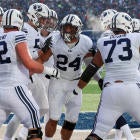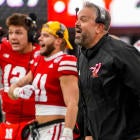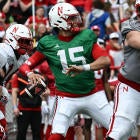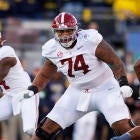It's Christmas in July for a dozen or so Group of Five schools. This may be now or never for Cincinnati, BYU, Houston, Connecticut, Memphis, Colorado State, Central Florida, Boise State, Tulane and others to win the lottery and land in a Power Five conference, albeit without an equal share of the money for a while.
Let the bidding begin for One True Discount. How low can you go in your bid to win the Big 12 auction? This is one auction where the lower the better so the Big 12 can pocket some of your money.
Forget summer vacations for these Group of Five presidents and athletic directors. The tantalizing combination of money and exposure -- the cornerstones of college sports -- are staring these schools square in the face. It's right there within their grasp to finally get a seat at the adult table.
The pressure is on to not get left behind again as the haves and have-nots continue their separation to wherever the great chase for money leads the NCAA's future. The Big 12 may expand since it doesn't want to be left financially behind the SEC, Big Ten, ACC and Pac-12. So there will be a free-for-all by Group of Five schools who don't want to be left behind in a chase that will dominate headlines into the 2016 football season.
This is how college sports works. Eat or be eaten.
American Athletic Conference commissioner Mike Aresco, whose league formed after getting eaten by the ACC and by eating Conference USA, sounded frustrated Wednesday. He tried to put on a brave face after the latest twist in "As The Big 12 Turns." The stark reality is this: While the American tries to build off its very successful 2015 football season, Aresco's schools will be competing to get the first ticket out of town.
"We're going about our business," Aresco said. "We have initiatives we're working on. Whatever is going to happen is going to happen. I'm working hard for this conference, and I'm proud of what we've accomplished with this conference. You just tune out the distractions. We've got members here who are relying on the conference to support them. That's our focus."
Aresco wouldn't say if he has spoken with some of his schools' presidents and athletic directors since the latest Big 12 news. "I really don't want to bring a lot of attention on this," he said.
Understandable. But that ship sailed a long time ago. Cincinnati, Memphis, Houston, UCF, Connecticut, Colorado State and BYU have made pitches behind-the-scenes for months that they want in the Big 12. Now Big 12 commissioner Bob Bowlsby is formally accepting their bids.
"I would say that we are looking for members that will grow over time as we grow," Bowlsby said, "that will bring stability to the conference and that have a high top end, will benefit from an affiliation with the schools that are currently in our conference."
The timing stinks for the American, whose current TV deal runs through the 2019 season. Earlier this spring, Aresco said negotiations with ESPN could start at the end of 2018, making the next couple seasons pivotal for the American to build on its 2015 success. CBS Sports Network airs American football games through a sublicensing agreement with ESPN.
"You might argue with [cable] cord cutting it may not be the best time to soon be negotiating," Aresco said this spring. "But I go back to my old statement: Content is king. I keep telling our membership, if we continue to be relevant and get fans interested in what we're doing and we're a really scrappy underdog that becomes a competitor, the networks will have an interest in us. It's that simple."
But no one in college sports turns down an "Advance to Boardwalk" card. It's the lottery ticket that gives you a chance to win in major college football and guarantees you'll spend a whole lot of money trying.
It's the chance to improve your school's visibility and donations. It's a chance to increase your enrollment with more out-of-state students. It's a chance to share company with a major research university like Texas.
TCU demonstrated the blueprint on how to get invited into the Big 12: Sell your academics, of course, so Texas is willing to be your neighbor; but also build yourself up athletically in advance so you're ready to win immediately in the Big 12.
(The West Virginia pick by the Big 12? Well, needless to say, the Big 12 is probably kicking itself that it didn't add Louisville when it could. At least Bowlsby doesn't now have to ask for information on Louisville prostitutes to go along with Baylor cover-ups of sexual assault.)
A Power Five invite is why Memphis has FedEx vowing to sponsor the Big 12 Championship Game and the school promising $500 million in academic and athletic infrastructure improvements over the next five years.
It's why BYU touts its national reach compared to the competitors by talking up the school's high football TV ratings and football and basketball attendance.
It's why Cincinnati spent $86 million to expand its football stadium with new luxury suites and sells itself as a good geographic partner for West Virginia.
It's why Colorado State hired football assistants from the SEC to be head coaches, is building a $238.5 million football stadium scheduled to open in 2017, and touts a large Big 12 alumni base.
It's why Houston built a 40,000-seat football stadium, has made $240 million in facility improvements, paid Tom Herman $3 million a year to stick around, and sells its location in America's fourth-largest city as a huge plus for TV and recruiting.
To understand what this lottery ticket would mean for a Group of Five school, follow the dollars. The Big 12's average payout to its full-sharing members in 2014-15 was $23.3 million, according to tax records. TCU and West Virginia did not yet get full shares and each received about $20 million.
Bowlsby has said Big 12 schools each got about $30 million in 2016. The payout increases to $35 million next year and $43 million by the end of the Big 12's current football TV deal in 2024, a source told CBS Sports' Dennis Dodd.
Now look at tax records in 2014-15 for the American Athletic Conference. They show the American distributed $10.6 million to Connecticut, $10.2 million to Cincinnati, and about $4.5 million each to UCF, Houston and Memphis. No wonder Houston board of regents chairman conducted a 1 a.m. interview Wednesday with the Houston Chronicle while on vacation in Monte Carlo.
Bowlsby has said the Big 12's TV deal allows any schools that are added to get the same payout as current members. I can't help but wonder if this latest round of Big 12 expansion talk is a negotiating ploy to get ESPN and Fox to pay the Big 12 more to not expand. In other words, "How much will you pay us to not contractually force you to pay us more?"
The timing of the Big 12 news can't be lost given reports that ESPN is going to create a digital network for the ACC this summer and a linear channel in 2019. This is the great chase by the ACC, Big 12 and Pac-12 to stay within shouting distance financially of the SEC and Big Ten, which have created their own penthouse because they have more rabid fan bases.
If Big 12 expansion happens, it's hard to imagine why ESPN and Fox would extend their current Big 12 deals anytime soon with eight years left on the contracts. There's no expansion candidate that immediately moves the TV needle. That would have to occur over time if the new members have success and show there's an appetite to watch them.
Sure, expansion might upset ESPN and Fox in the next round of TV negotiations. The Big 12, though, appears to be saying it's willing to take that risk in order to add immediate cash to keep up with the Joneses and not get eaten by someone else.
"In both the case of the championship game and in the case of the pro rata adjustments, we're in complete compliance with the contract," Bowlsby said. "I don't think we have to make apologies for activating around stipulations that we both agreed to."
So let's try to take the Big 12 at face value that it seriously wants to expand, even though the conference flips positions on this topic more often than a politician during election season. The Big 12 doesn't have to share that new contractually-obligated TV money equally with the new schools.
Group of Five schools can allow their imagination to run wild while lining up to make their bids. How low will you go? The answer is simple: as low as necessary.
Because when it's Christmas in July, you don't want to be left standing alone under the mistletoe.





















